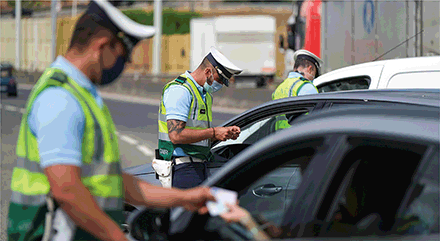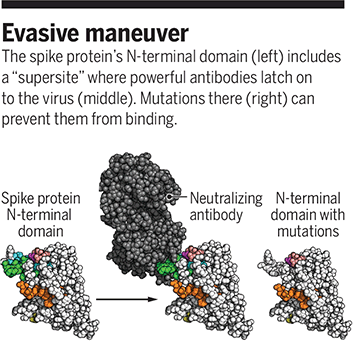Science‘s COVID-19 reporting is supported by the Heising-Simons Foundation


Police officers stop cars at a checkpoint to prevent unauthorized travel into and out of Lisbon, Portugal, on 18 June.
PHOTO: REUTERS/PEDRO NUNES
When the coronavirus variant now called Delta first appeared in December 2020, in the Indian state of Maharashtra, it did not seem all that remarkable. But when it descended on New Delhi a few months later, its impact was devastating, with almost 30,000 cases reported daily in late April. “Suddenly … it is dominant and completely sweeps away Alpha,” which until then was most prevalent in the city, says Anurag Agrawal, who leads the Institute of Genomics and Integrative Biology in New Delhi.
New Delhi seemed unlikely to suffer a big new outbreak because so many of its residents had already been infected or vaccinated, Agrawal says. But those protections seemed to barely slow Delta, which is more transmissible and may evade immunity, he says: “It went from a 10-foot wall around the city to a 2-foot wall you could just walk over.”
From New Delhi, the variant has quickly spread, and it now looks set to sweep the globe in what could be a devastating new wave. In the United Kingdom, Delta already makes up more than 90% of all infections; it has driven COVID-19 case numbers up again after a dramatic decline and led the government last week to postpone the final stage of its reopening plan. A Delta-driven resurgence in Lisbon prompted the Portuguese government to enact a 3-day travel ban between the city and the rest of the country. Delta also appears to be causing surges in Russia, Indonesia, and many other countries. In the United States, where its prevalence is now estimated to be at least 14%, the Centers for Disease Control and Prevention declared Delta a “variant of concern” on 15 June.
The surge has set off a frenzy of research to understand why Delta appears to spread so much faster than the three other variants of concern, whether it is more dangerous in other ways, and how its unique pattern of mutations, which cause subtle changes in its proteins, can wreak havoc. Delta’s arrival has also brought fresh attention to the potential of SARS-CoV-2 to evolve and adapt in the months and years ahead. For the moment, Delta is a particular threat to the poorest countries with little or no access to vaccines, says Soumya Swaminathan, chief science adviser at the World Health Organization. “My immediate worry is what will happen when Delta is introduced into Africa,” she says. “You could end up with explosive outbreaks.”


ILLUSTRATIONS: AJ VENKATAKRISHNAN/NFERENCE
Research by Public Health England underscores Delta’s ability to spread. Compared with Alpha, which appeared in the United Kingdom in 2020, “You’re getting estimates of 50% or 100% more transmission,” says Adam Kucharski, a modeler at the London School of Hygiene & Tropical Medicine.
But Kucharski says reduced protection from vaccines may play a role as well. Data from England and Scotland indicate that both the Pfizer-BioNTech and AstraZeneca vaccines offer slightly less protection against symptomatic infections from the new variant than from Alpha. People who have received just one shot of vaccine—as many U.K. residents have—are especially vulnerable. (Two doses of either vaccine still offer the same high level of protection from hospitalization from Delta.) How well the many other vaccines now in use around the world protect against it is unclear, and there are few data on the protection resulting from a prior bout of COVID-19.
The two effects—increased transmissibility and immune evasion—are hard to disentangle, but “I would argue the Delta variant has been driven by its transmissibility, not its ability to escape immunity,” says Jeremy Farrar, head of the Wellcome Trust. “If Alpha really is approximately 50% more transmissible than the wild type strain, and Delta is 50% more transmissible again than Alpha, we’re talking about a virus that’s more than twice as transmissible as the initial strain,” adds Aris Katzourakis, an evolutionary virologist at the University of Oxford. That would mean countries and populations with low vaccination rates are likely to see big new outbreaks. Indeed, if the faster spread “is entirely down to the fundamentals of the virus, that’s catastrophic news for the rest of the world,” Kucharski says.
On top of this, Delta may be more likely to put unvaccinated people in the hospital than Alpha. Early data from the United Kingdom suggest the risk of hospitalization may be twice as high. Together these characteristics could cause huge problems in Africa, Swaminathan says. “There isn’t going to be enough oxygen there, there aren’t going to be enough hospital beds. And we already know that outcomes for people that are hospitalized in Africa are worse than in other countries,” she says. “So this could really lead to higher mortality, even among younger people.”
SCIENTISTS ARE just beginning to probe what makes Delta so dangerous. They’re concentrating on a suite of nine mutations in the gene encoding spike, the protein that studs the virus’ surface and allows it to invade human cells. One important mutation, called P681R, changes an amino acid at a spot directly beside the furin cleavage site, where a human enzyme cuts the protein, a key step enabling the virus to invade human cells. In the Alpha variant, a mutation at that site made cleavage more efficient; a preprint published in late May showed Delta’s different change makes furin cleavage even easier. The researchers suggest this could make the virus more transmissible.
Japanese researchers who made pseudoviruses carrying the mutation have not found it to confer increased infectivity in the lab, however, and in India, other coronavirus variants that include the same mutation have been far less successful than Delta, says evolutionary virologist Andrew Rambaut of the University of Edinburgh. “So it must be an interaction with something else in the genome.”
Other mutations in Delta could help it thwart immunity. Some alter the spike’s N-terminal domain (NTD), which protrudes from the protein’s surface. A recent Cell paper identified one spot in the NTD as a “supersite,” unfailingly targeted by “ultra-potent” neutralizing antibodies from recovered patients. Delta’s unique mutations delete the amino acids at positions 156 and 157 in the supersite and changes the 158th amino acid from arginine to glycine; the latter eliminates a direct contact point for antibody binding, says David Ostrov, a structural biologist at the University of Florida. “We think the 157/158 mutation is one of the hallmark mutations in Delta that has given it this more immune-evasion phenotype,” concurs Trevor Bedford, a computational biologist at the Fred Hutchinson Cancer Research Center.
Another mutation in the NTD supersite may also help rebuff antibodies. And scientists should start to examine the role of changes in other Delta variant proteins, says Nevan Krogan, a molecular biologist at the University of California, San Francisco. “There is so much we don’t know about these variants on every level. We are so in the dark.” Delta has several mutations in the nucleocapsid protein, for example, which has many jobs, “like a Swiss Army Knife protein,” says virologist David Bauer of the Francis Crick Institute. The experiments to bring clarity will take months, however.
IN THE MEANTIME, scientists agree urgent action is needed to stop the spread of the new variant. “Worries about Delta should galvanize us to really ramp up vaccination efforts and surge vaccines to places where Delta is ticking up,” says virologist Angela Rasmussen of the University of Saskatchewan. U.S. President Joe Biden on 18 June urged young people to get fully vaccinated to protect themselves from Delta. Countries with little access to vaccine need to resort again to interventions such as physical distancing and masks, Rasmussen says.
The goal is not just to save lives immediately, but also to give the virus less room to evolve further. Delta’s success has shown scientists aren’t able to identify dangerous new variants in time to stop them spreading, says Emma Hodcroft, a virologist at the University of Basel, despite an unprecedented global effort to track its evolution in real time (Science, 21 May, p. 773). And it would be dangerous to assume that SARS-CoV-2 can’t do much better, Katzourakis says. “Anything that’s happened at least twice in evolution is part of a pattern,” he says. “I would be very unsurprised if we saw equivalent changes over the coming year or two.”


